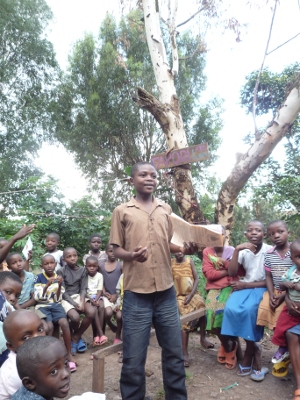Now grown up, Tapori children take on the role of youth workers.

There have been Tapori groups in Bukavu,in the east of the Democratic Republic of the Congo, for 15 years, helping hundreds of children to blossom, trying to become “ friends of the friendless” and forging relationships with children the world over.
Some of them, now adolescents,want to continue in the same spirit and have created youth groups.
he objectives of these groups are many and varied:
- setting up meetings for Tapori children in their areas
- training
- giving out advice and providing an environment where, with the support of a few adults, young people can reflect on their lives
- through community work,establishing acts of solidarity in their local areas.

At present, around 30 of them, aged between 14 and 18, are spread amongst the groups at Burhiba, Kadutu and Muhungu. They are much admired by their elders, like Rene who says “ If you ask them why they’re with the children, these young people have no answer. But watching them, you can see their thirst to pass on their own experiences.”
For most of them, their commitment springs from their own Tapori journey .Nathalie, aged 15, who took part in the 2009 Geneva assembly, recalls that “ In Tapori, everyone is considered in relation to everyone else. In Tapori there’s no rich and poor. Even if you’re very wealthy, you do the same as everyone else.” for Rosine, “ When I was a child, my youth worker taught me not to despise myself. I wanted to be a volunteer to show the children what I’ve learnt .We tell the children not to fight, not to laugh at people who fall over, so that they will become good men .”
Far from feeling superior to the children, these young people recognise that , in fact, they learn from the younger ones. As Nadine says “ The children teach us the value of friendship. When grown ups fall out, they split up. Children get back together again.”
Some of them had dreamed for a long time of becoming youth workers. Nathalie remembers “ they read us books and letters and I wanted to read to children too. I dreamed of becoming a youth worker, because all these messages are not fleeting, like running water, no ! They are morale boosting.”
As for Laurent, he would get angry after a session when children like himself had to leave , whilst the leaders carried on discussing amongst themselves. “Putting on a poster display in town, taking part in a radio programme, that’s what drove me to become a volunteer. “
Others drifted away from Tapori ( for a while ) but Julien chose to return because, as he puts it “Tapori is like my left lung .”
Some are capable of running children’s meetings without the help of “first or second generation” volunteers, but one of their elders, Justin, points out ,“we shouldn’t give up because these younger people are here. We should still be around to guide them.”
This accompaniment is expressed during the activities, with the more experienced,older volunteers discreetly supporting and encouraging the younger ones in the responsibilities they are taking on.
If necessary, they underline as well, the importance of regularity, reminding them , as Stallone did, of the expectations of the children, disappointed if volunteers let them down. Or, the importance of helping the most timid or withdrawn children to gain the confidence to express themselves freely.
Tapori coordinators organise training sessions to give the young people a greater knowledge of the movement , it’s history, it’s ethos and the tools at their disposal. This training drives them to take on more responsibilities, as Destin explains “responsibility means that we have to become well informed so that we have ideas to put to the children.” Or Nathalie, “During the activities, I make sure I listen to the opinions of all the children, not just the ones who go to school and can read and write, I treat them all on an equal footing. I write for the ones who can’t, so they don’t feel left out. ”
Laurent says “ I like the guidance we came up with ourselves , that we should lead exemplary lives as the children see us around all the time.”
The older volunteers are also points of reference for the younger ones. In a context of ever present violence and fear, where all around them, young people lead “bad lives,” Tapori youth question themselves on the meaning of their lives, on what attitudes to adopt. As Saleh says “ It’s important for the young to ask questions of their elders, for example about AIDS or how to behave in life.”
How do these young people perceive their involvement ?Let’s give the last word to Germaine. “ I can’t leave Tapori because I haven’t yet attained my objective.My objective is an end to poverty. It’s not yet ended so I can’t stop.“







